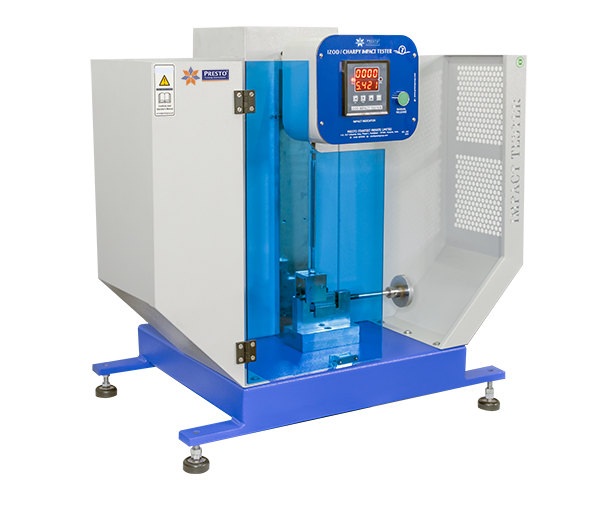Izod and Charpy Impact Testing: Key to Measuring Material Toughness

In industries where material strength and durability are critical—such as plastics, metals, automotive components, and aerospace—impact resistance is one of the most crucial properties to test. This is where Izod and Charpy tests come into play. Both are standard methods for measuring the toughness of materials using a specialized instrument known as the Izod Charpy Impact Tester.
This blog will walk you through the working principles of these tests, their differences, the importance of the Izod impact tester, and how to interpret an Izod impact test lab report effectively.
What Is an Izod Charpy Impact Tester?
An Izod Charpy Impact Tester is a mechanical testing device used to determine the amount of energy a material can absorb before fracturing. It measures the impact strength of materials, i.e., their resistance to sudden force or shock loads.
The tester is designed to perform both Izod and Charpy impact tests, which are standardized by organizations such as ASTM and ISO. Both tests involve striking a notched specimen with a swinging pendulum hammer, but they differ in specimen positioning and energy application.
Izod vs. Charpy Test: What’s the Difference?
While both tests aim to measure a material’s toughness, their setup and orientation are different:
| Feature | Izod Test | Charpy Test |
|---|---|---|
| Specimen Position | Vertical | Horizontal |
| Notch Direction | Facing the hammer | Opposite to the hammer |
| Support Type | Clamped at one end (cantilever) | Supported at both ends (simply supported) |
| Standard Reference | ASTM D256 | ASTM E23 / ISO 179 |
Both methods help determine how a material will behave under sudden mechanical stress, such as during a drop, collision, or crash.
Why Is the Izod Impact Tester Important?
The Izod impact tester is a fundamental tool in material testing laboratories because it helps manufacturers:
-
Evaluate impact resistance of polymers, metals, and composites.
-
Ensure safety and reliability of products in end-use conditions.
-
Compare different material grades for structural applications.
-
Comply with quality and safety standards (ASTM, ISO).
From plastic manufacturers to auto part suppliers, everyone relies on impact testing to make informed decisions about materials before using them in real-world products.
Features of an Advanced Izod Charpy Impact Tester
When investing in an impact tester, modern testing labs often look for machines with:
-
High-speed digital display for precise energy readings.
-
Interchangeable fixtures to perform both Izod and Charpy tests.
-
Robust pendulum impact arm for accurate energy delivery.
-
Automatic sample release mechanism.
-
Compliance with ASTM D256, ISO 179, and other global standards.
-
Integrated software for data logging and reporting.
Such features allow consistent testing and reduce the margin of error, especially during repetitive lab tests.
Izod Impact Test Lab Report: How to Interpret Results
A typical Izod impact test lab report includes:
-
Material name and type (e.g., ABS plastic, mild steel).
-
Specimen dimensions and notch details.
-
Energy absorbed before fracture (usually in joules).
-
Fracture behavior (brittle, ductile, mixed).
-
Test temperature (optional but critical for polymers).
-
Number of samples tested and average result.
These reports help engineers and designers identify whether the material will withstand operational impact or fail under stress.
For example, a higher impact energy value indicates better resistance to breaking. Conversely, a brittle fracture with low absorbed energy suggests poor toughness.
Industries That Use Izod and Charpy Testing
Impact testing is widely used in the following industries:
-
Plastic & Polymer Manufacturing – Ensures toughness of packaging films, containers, and automotive parts.
-
Metal Fabrication – Tests welded joints, steel plates, and casting materials.
-
Automotive & Aerospace – Ensures safety of structural parts during crashes or extreme impact.
-
Research Labs – Compares new material formulations and thermal effects on strength.
How Much Does an Izod Charpy Impact Tester Cost?
The Izod Charpy Impact Tester price varies depending on the model, build quality, and features. Basic manual machines may start at around ₹90,000–₹1,50,000, while advanced digital testers with dual functionality can range from ₹2,50,000 to ₹5,00,000 or more.
Factors influencing price:
-
Digital vs. Analog readouts
-
Dual-purpose (Izod & Charpy) vs. single
-
Automated sample handling
-
Brand reputation and service support
It’s essential to choose a machine that matches your testing requirements and complies with the relevant standards.
Conclusion: Enhancing Material Safety with Impact Testing
Understanding a material’s toughness is essential for ensuring safety, reliability, and performance. With an Izod impact tester, manufacturers can gain valuable insights into how materials behave under sudden force—information that’s vital across industries.
Whether you're preparing an Izod impact test lab report, developing a new product, or ensuring compliance, investing in a quality Izod Charpy Impact Tester is crucial for data-backed decisions.
✅ Ready to Test Your Material Strength?
Get in touch with us to explore the most advanced range of Izod and Charpy impact testers.
📞 Call: +91 9210 903 903
📩 Email: info@prestogroup.com
- Art
- Causes
- Crafts
- Dance
- Drinks
- Film
- Fitness
- Food
- Games
- Gardening
- Health
- Home
- Literature
- Music
- Networking
- Other
- Party
- Religion
- Shopping
- Sports
- Theater
- Wellness


